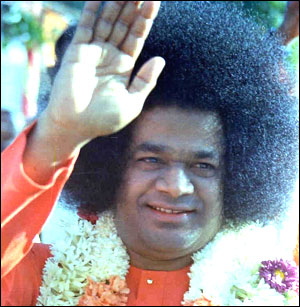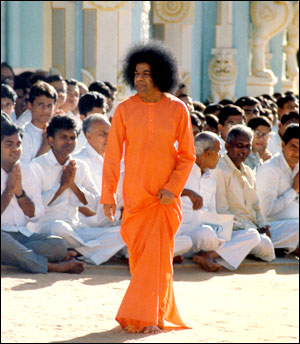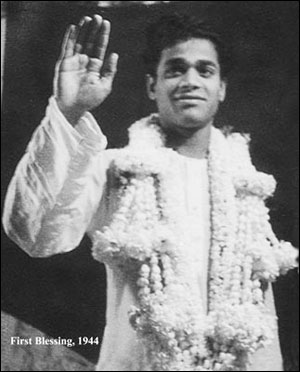 |
 |
 |
| Volume
3 - Issue 4 APRIL 2005 |
|
| Grace is a word
pregnant with meaning. Every one wants it but most of us cannot define
it though we intui¬tively know what it means, at least roughly.
But all of us know one thing:The seeker of Grace is the devotee, and
the one who confers it is the Lord. H2H takes you on an exploration
to discover the meaning of this profound term…
Many of you
have problems of health or mental worry of some son or the other.
They are mere baits by which you have been brought here, so that you
may contact the Grace and strengthen your faith in the Divine. Problems
and worries are really to be welcomed as they teach you the lessons
of humility and reverence. |
Some people
complain that they do not receive God's Grace. This is not true.
Swami assures us that: But whether
or not people receive it, depends entirely upon them. He gives two
analogies to explain this. Supposing it rains and a person wants
to collect the rainwater; then the person must do something about
it. He must take an empty vessel and place it in the
rain so that the rain water may collect inside; the larger the vessel,
the more is the water collected. If the person takes the vessel
out into the rain but foolishly places it upside down so that the
mouth of the vessel does not face the sky but the ground, then one
cannot expect any water to be collected in the vessel. Naturally,
such an act would be considered to be the height of stupidity and
yet this is precisely the kind of mistake committed by many of us
when we go for Darshan. We go from great distances spending a lot
of money and yet during Darshan,our attention is not on Baba but
on all the trivial things happening around. This is where Swami's
second analogy comes in.
He says that
suppose one has a short-wave radio receiver. Present in the room
where the radio is, are electromagnetic waves originating from various
radio stations in the world - London, Moscow, Beijing, or whatever.
If one wants to hear a particular station, then one must do two
things; firstly one must switch the radio on, and next one must
tune the radio to the particular station one wants to hear. Coming
to Darshan is like switching on the radio but merely turning the
radio on is not enough; one must also tune it. In the same way,
one must not merely come to Darshan but tune one's mind to Swami
just before, during, and for a while at least, after the Darshan.
04 The bigger the vessel, the more is the rainwater collected; the
better the tuning, the clearer is the reception. In the same way,
the larger the heart, the more is the Grace received.
|
Whether we are
aware of it or not, God's Grace is always with us. It is therefore
our duty to be conscious of all the blessings bestowed on us and
make use of them properly. Wealth is a particularly important example.
People often think that they have become rich on account their shrewd
investments, business acumen, wheeling and dealing, or whatever.
Not true! If a person is wealthy, it is entirely because of God's
Grace. The rich must be conscious of this; not only that but they
must also realise that the wealth they possess has actually been
given by God to be held in Trust for Him and is meant to be used
for His work. Thus the wealth acquired must not be frittered away
in gambling and other pleasure-seeking activities, but must be used
for charitable causes. As Swami emphasises, It is all you have ever to attain, it
is your only goal, the only object, the only purpose; the consummation
of your life is to earn His Grace.
|
| Optimized for Netscape and Firefox. Best viewed in Internet Explorer - 1024 x 768 resolution. |

 Out
of the energy coming from the Sun, we use only a tiny fraction .............
Out
of the energy coming from the Sun, we use only a tiny fraction .............


